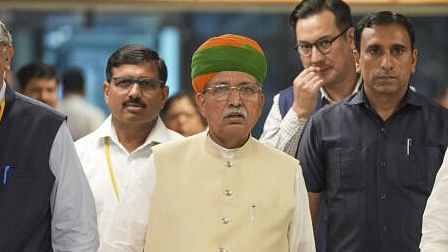
Union Law Minister Arjun Ram Meghwal.
Credit: PTI Photo
New Delhi: Over 200 proposals sent by various high court collegiums for high court judgeship are at various stages of processing, the Lok Sabha was told on Friday.
In a written reply, Law Minister Arjun Ram Meghwal also cited an opinion of the Supreme Court Collegium that expression of views by a candidate does not disentitle him or her to hold a constitutional office so long as the person proposed for judgeship is a person of competence, merit and integrity.
There have been instances in the past where the government had either held back or returned to the collegium for consideration names of persons who had expressed their views on various issues as advocates.
Meghwal told the House that the government, as an important stakeholder in the process of appointment of Judges in the high courts and as laid down in the Memorandum of Procedure, provides inputs which mainly contain information on the suitability, competence and integrity of the candidates under consideration for appointment to high constitutional post in the judiciary. The recommendations along with inputs are then submitted to the SC Collegium for advice.
As per the procedure, the high court collegiums send their recommendations to the Department of Justice in the law ministry which adds inputs on the candidate along with IB reports and sends it to the SC Collegium to take a call.
As on date, 205 proposals recommended by the various high court Collegiums are at various stages of processing, he said.
Appointment of SC and HC judges is a continuous, integrated and collaborative process between the Executive and the Judiciary. It requires consultation and approval from various constitutional authorities both at state and central level, he noted.